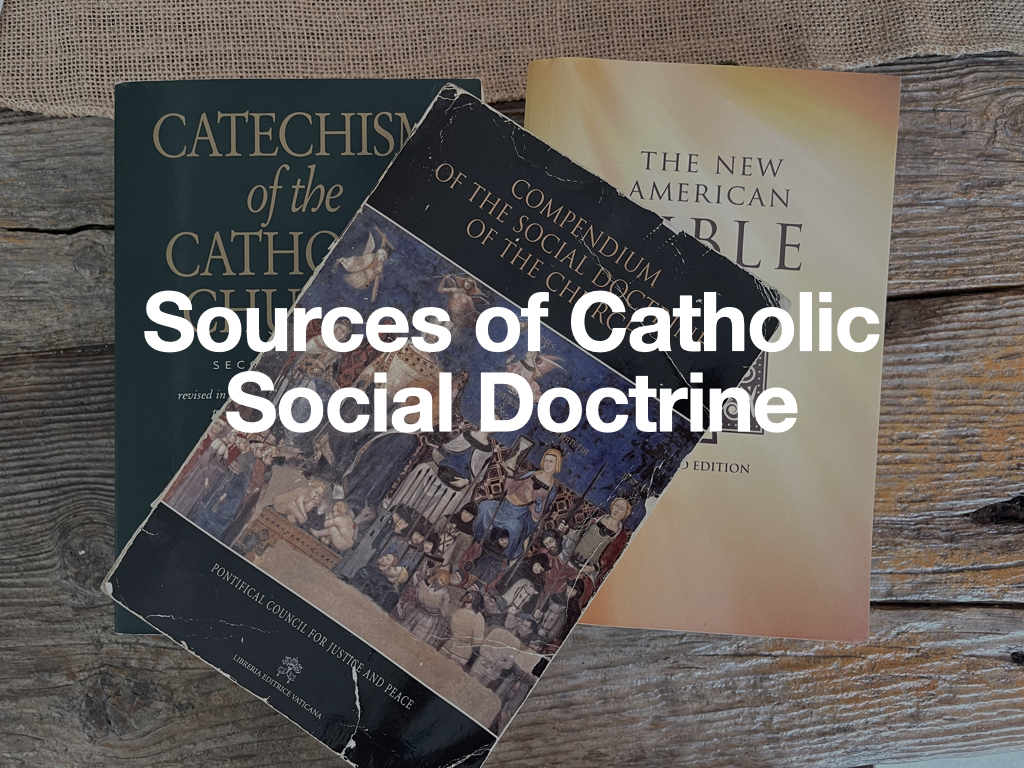
Sources of Catholic Social Doctrine
By Christopher Dodson
Executive Director
North Dakota Catholic Conference
July 2023
I often write about Catholic social doctrine in these columns, usually as to how it pertains to a particular issue facing our communities. I have written less about the body of Catholic social doctrine itself.
In my column for last March, I wrote about the roots of Catholic social doctrine. I noted that the Compendium of the Social Doctrine of the Church states: “[Social Doctrine] has its roots in Sacred Scripture, especially the Gospels and the apostolic writings, and takes on shape and body beginning from the Fathers of the Church and the great Doctors of the Middle Ages, constituting a doctrine in which, even without explicit and direct Magisterial pronouncements, the Church gradually came to recognize her competence.”
But those are the roots. Where can a person find the official social teachings and what resources summarize or elaborate on those teachings?
Let’s start with the basics. I have long thought that every Catholic house should have a copy of the Bible, the Catechism, and the Compendium of the Social Doctrine of the Church. The Catechism has many sections on social issues, especially in Part Three — Life in Christ. The Compendium — not to be confused with the Compendium of the Catechism — was promulgated by Saint Pope John Paul II to summarize the Church’s social doctrine with more detail than the Catechism. Both are available in book form and online.
The Catechism and the Compendium are summaries. They are not official teaching documents themselves. Those teachings usually come from papal encyclicals. These are part of the Church’s magisterium — her teaching authority.
Here are some of the most important social encyclicals:
- Rerum novarum (1891),
- Quadragesimo anno (1931)
- Mater et magistra (1961)
- Pacem in terris (1963)
- Populorum progressio (1967)
- Humanae vitae (1968)
- Laborem exercens (1981)
- Sollicitudo rei socialis (1987)
- Centesimus annus (1991)
- Veritatis splendor (1993)
- Evangelium vitae (1995)
- Fides et Ratio (1998)
- Deus caritas est (2005)
- Caritas in veritate (2009)
- Laudato si' (2015)
- Gaudete et exsultate (2018)
- Fratelli tutti (2020)
In addition to the encyclicals, the documents of Vatican II are official teachings. Two of the most significant documents in the area of social teaching are: Dignitatis humanae and Gaudium et spes.
Here are some suggestions for those who want to delve into the social encyclicals. First, some people might find the encyclicals difficult to digest. They can be long and wordy. If that is the case for you, summaries of the encyclicals are available online. Our colleagues at the California Catholic Conference have summaries of each encyclical at: https://cacatholic.org/social-encyclicals.
Second, many of the encyclicals address certain issues, such as human life, working conditions, and the environment. Some are responses to political or social issues of the time. Despite this, they should not be compartmentalized. Catholic social doctrine should be viewed as a whole. All of them are connected to each other and should be read in light of each other.
Third, the age of the document is irrelevant with regard to its teaching. The time it was written might help understand the circumstances leading to the document, but the teaching remains. The first social encyclical, Rerum novarum, is just as relevant today as it was in 1891.
Fourth, avoid applying personal political views, views about particular popes, or even views about church history to the encyclicals. Pope Benedict XVI warned against this in Caritas in veritate. He wrote: “[C]larity is not served by certain abstract subdivisions of the Church's social doctrine, which apply categories to Papal social teaching that are extraneous to it. . . [T]here is a single teaching, consistent and at the same time ever new. It is one thing to draw attention to the particular characteristics of one Encyclical or another, of the teaching of one Pope or another, but quite another to lose sight of the coherence of the overall doctrinal corpus.” (No. 12)
Pope Benedict’s following words also warrant restating here because they express other fundamental truths about Catholic social doctrine. He continues, “Coherence does not mean a closed system: on the contrary, it means dynamic faithfulness to a light received. The Church's social doctrine illuminates with an unchanging light the new problems that are constantly emerging. This safeguards the permanent and historical character of the doctrinal “patrimony” which, with its specific characteristics, is part and parcel of the Church's ever-living Tradition.”
In other words, Catholic social doctrine is just that — doctrine. It is not the personal political views of a pope at a particular time. Even as it responds to new social problems, it is part of the Church’s permanent teaching protected by the Holy Spirit. For that reason, every Catholic should try to learn something about Catholic social doctrine.
What We Do
The North Dakota Catholic Conference acts on behalf of the Roman Catholic bishops of North Dakota to respond to public policy issues of concern to the Catholic Church and to educate Catholics and the general public about Catholic social doctrine.

Contact Us
North Dakota Catholic Conference
103 South Third Street, Suite 10
Bismarck, North Dakota
58501
1-888-419-1237
701-223-2519
Contact Us

